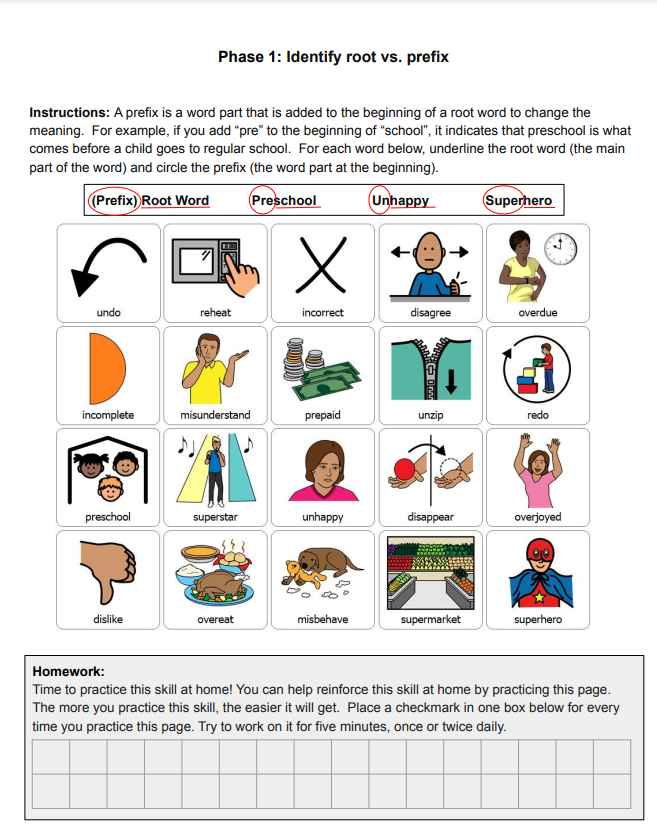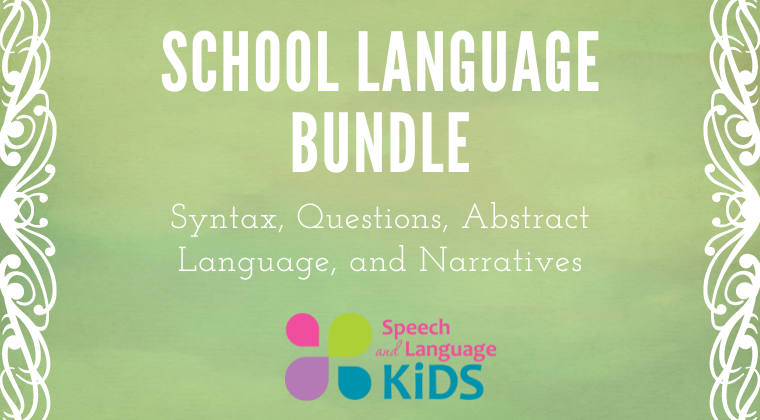8-Year-Old Speech and Language Development Milestones:
The following skills are all expected to emerge by the end of 3rd grade (8-9 years old). Not all children will acquire all of these skills by this age. If a child is missing a few skills, we generally don’t worry too much. However, if a child is far off from many of these skills, we like to get them in for a speech/language assessment/evaluation.
This page is recommended as a general guide to give you an ideas of skills you could address within this age bracket. It is not meant to diagnose a child or provide treatment recommendations. SLK Hub is for informational and educational purposes only and does not provide medical or psychological advice.
* To view the sources for this information, please scroll to the bottom. School-age language skills are taken from the Common Core State Standards. This is a standardized curriculum that is commonly used in the United States. Not all school curriculums will follow these language skill timelines exactly.
8-Year-Old Speech Milestones (Sound Production)
8-Year-Old speech milestones refer specifically to the sounds that a child is able to speak. We use the term “speech” to refer to how a child pronounces words, whereas “language” is used to describe how children use those words to create sentences and communicate with those around them.
- Intelligibility: Is understood all of the time
- Uses all speech sounds correctly (keep in mind some areas limit the speech sounds that school SLPs can address until later ages)
- Is no longer be using phonological processes (speech sound error patterns)
8-Year-Old Language Milestones
When we look at 8-year-old language milestones, we are looking at how a child is using words and putting those words together to communicate with those around them. A lot goes into language skills. Here is a checklist of the 8-year-old language development milestones. School-age language skills are taken from the Common Core State Standards. This is a standardized curriculum that is commonly used in the United States. Not all school curriculums will follow these language skill timelines exactly.
- Can ask and answer questions to demonstrate understanding and clarify things that are unclear.
- Can tell or retell real or imagined experiences or events using effective technique, descriptive details, and clear event sequences.
- Can convey ideas and information clearly (with spoken language) by stating a topic, providing details about it, using linking words (like “also” and “but”), and making a concluding statement.
- Can state opinions (with spoken language) by stating an opinion and providing reasons that support their opinion.
- Can explain the function of nouns, pronouns, verbs, adjectives, and adverbs.
- Can form and use different types of nouns, such as regular and irregular plural nouns (cats, children, etc.) and abstract nouns (childhood).
- Can form and use various types of verbs, including regular and irregular verbs and simple verb tenses (e.g., I walked; I walk; I will walk).
- Uses correct subject-verb agreement (“he walks” instead of “he walk”) and pronoun-antecedent agreement (using a pronoun that matches the subject of the sentence) when speaking.
- Uses possessives when speaking (possessive ‘s and possessive pronouns like “his/her”).
- Can correctly use comparatives (bigger, faster) and superlatives (biggest, fastest) when speaking.
- Speaks in a variety of sentence types, including simple (I walk to the store), compound (I walk to the store and she walks to the park), and complex (Since I was out of bread, I walked to the store).
- Can use sentence-level context as a clue to the meaning of an unknown or multiple-meaning word or phrase (ex: Can read a sentence and figure out an unknown word based on the rest of the sentence).
- Understands how a word is broken up into a root word and prefixes/suffixes. Can guess the meaning of an unknown word by looking for familiar roots, prefixes, and suffixes.
- Can use a beginning dictionary (print or online) to determine or clarify the meaning of a word.
- Can distinguish the literal and nonliteral meanings of words and phrases in context. (ex: the teacher told the children to “take their seats” but she meant “sit down”).
- Can distinguish shades of meaning among related words that describe states of mind or degrees of certainty (e.g., suspected vs. knew; nervous vs. terrified).
- Can identify real-life connections between words and their use (describe people who are friendly or helpful).
8-Year-Old Social Skill/Interaction Milestones
Another aspect of 8-year-old speech milestones is how well they can interact with others. Here are some milestones related to social skills and interaction.
- Listens well in groups
- Asks and Answer Questions
- Stays on topic and introduces new and related topics
- Tells a shorter version of a story correctly
- Knows how to talk in different ways in different places. For example, using a quiet voice in the library and an “outside” voice on the playground.
- Peer and friend groups take precedence over family
- Shows increasing independent decision-making and a growing need for independence from family
- Starts to understand sarcasm and its pragmatic purpose
For more resources on teaching social skills to children, click here.
Activities and Ideas for Boosting Language Skills in Children:
If you are looking for therapy ideas or home activities to boost a child’s language skills, check out all of our resources inside The Hub!

About the Author: Carrie Clark, MA CCC-SLP
Hi, I’m Carrie! I’m a speech-language pathologist from Columbia, Missouri, USA. I’ve worked with children and teenagers of all ages in schools, preschools, and even my own private practice. I love digging through the research on speech and language topics and breaking it down into step-by-step plans for my followers.
Connect with Me:








I have an 8 year old LAC and his speech and language skills are very poor. He has had therapy but does not seem to be improving. He can say very, very few basic words correctly for example:
Twenty = chennie
Seven = seddon
Play = pray
Blue = boo
Mirror = midda
Smell = mell
He cannot be understood by strangers and even family struggle to know what he is saying a lot of the time. He also cannot speak in proper sentences or have a conversation. Instead of saying ‘where is she?’ He will say ‘Where are her?’ What do we do with him now?
Hi, Jane! Since I’ve never met your child, I cannot tell you specifically what will be best for him. I would speak with your child’s therapist about what to work on next or look for a second opinion if you feel you are not connecting well with your current therapist. I can point you to a few of my pages that may help though:
Speech Sound Resource Page:
http://www.speechandlanguagekids.com/speech-sound-resource-page/
Grammar Resource Page:
http://www.speechandlanguagekids.com/grammar-resource-page/
I hope that helps!
Hi my daughter is 8 years old an talks very clearly but she cannot express her feelings clearly . She can do only one way talking clearly but if you start discussing on some topic with her she cannot reply properly. She is in grade 3 and still cannot write stories properly. Is lack in writing skill is a result of language development?? First we thought she is dyslexic but she is not . We already did her dyslexic test also.
Hi there!
Many children with language disorders also have trouble talking about their feelings and putting together stories/narratives that make sense. I definitely recommend looking for a speech-language pathologist in your area who can evaluate your daughter to check for language delays. The speech-language therapist at your child’s school should be able to help with this!
Hello Sabi I read your concern about your daughter. I’m going thru the same with my son, can you please tell me what did you do? were you able to get her tested for any type of language disorders or other condition? Please can you answer my question. I’m desperate I don’t know where to go or what to do.
Thank you
I have 8 year old son who has ADHD, Tourette and expressive speech disorder. He can’t express his thoughts properly,. He will talk whatever he wants but can’t hold the conversation. Due that he has poor social skills and being in grade 3rd he is having problem in compherhensions. He can’t even write journals or short stories. His study is suffering. School refusing to provide him speech therapy. My only worry is Will he ever grow out of it. Very scared worried for his future. Thank you.
I’m so sorry to hear about your son’s troubles! Keep in mind that just because a child doesn’t qualify for services through the schools, it doesn’t mean that there isn’t help available. Try looking into outside services through a private speech therapy clinic in your area!
Mam my son is 8 yrs he is having less clarity in speech.He can individually pronounce all sounds except/ r /.In discourse he will be getting problems .My therapist told it will improve but only slight difference is seen . Sometimes it is good and it becomes worst
Hi, Ramya-
Here is a link from Carrie’s site pertaining to the /r/.
Hi , My kid is 9 years old boy and he stammers on fews words and feels in difficulty in uttering them. On few words he makes efforts and speak them 5 -6 times and problem is he repeats words.
Can you please help on right speech therapy material for him
Hi, Sunil-
Here are a few resources that you may want to check out: Middle School and stuttering.
My son had what we thought were speech issues but it turned out he had a substantial hearing loss that contributed to his speech issue. He could not tell the difference between high-frequency sounds like sh – f – p – th. They just dropped out of his hearing. After 2 year of SLP, our pediatrician suggested we re-test his hearing. BAM, hit it. If you child had very high fevers or needed powerful antibiotics as an infant, get their hearing checked. It may be the root of a speech, reading, writing, behavior issues. Good luck!
Hi Claire,
How did they find this out? Through a regular hearing test? How were those letters determined were falling out of his hearing? My son had high temps and string antibiotics as an infant.
My son can anderstand but the problem is he can’t speak letters he know to sang abc but when I show the letter he can’t recognise it.
Sorry for my statement Im not good in English.. I’m Filipino
Hello, Kevin! Thank you so much for reaching out. Unfortunately, we get a ton of questions every day about how to solve specific speech/language problems. Since we have such a small staff, we aren’t able to answer every question that comes through on the website, social media, or via email. If you are a parent, we suggest you reach out to a local speech-language pathologist who can work with your child directly and answer your question.
If you are another speech-language professional, we have created a membership where we pay a full staff to answer questions like this on a regular basis. We would be more than happy to answer your question inside the membership program. We’re able to answer more questions in here because we have a full library of questions that we’ve already answered so our staff can either link you to the answer if it exists, or write you a custom response if needed. We’d love to see you inside the membership!
Click Here to Become a Member: https://www.slpsolution.com/pediatric-signup/.